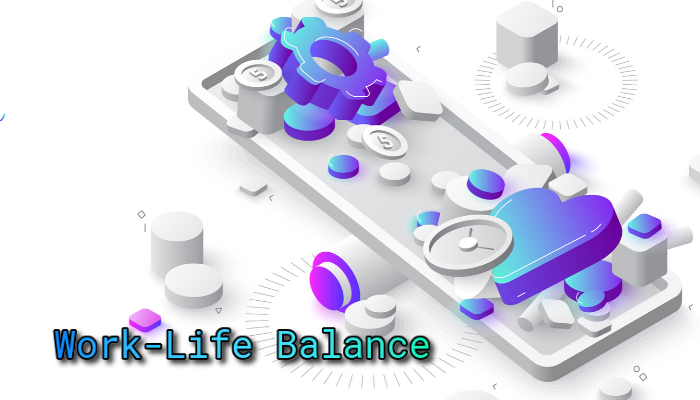Introduction: The Importance of Work-Life Balance
The meaning of Work-Life Balance is the one thing that has not changed even as other traditions and beliefs about workplaces undergo metamorphoses. Quite simply, a person’s job is the role that he/she plays in society to keep its quality intact.
The question of Work-Life Balance emerges when there is a conflict between one’s role performed for a consideration (a salary or a commission) and the role one plays in the family or for personal fulfillment. Most often, the latter one is referred to as ‘life’ to indicate ‘life outside of work’.
The Need for Meaning in Work
The fact remains that people – whether they work at home or in an office – look for meaning in what they do. And no amount of compensation earned from work can make them feel better about losing family time, time to relax and enjoy some idle hours, play with their children or hang out with their friends. Employee morale starts to drop when they do nothing but work. It is not long before their motivation levels also flag and it begins to show in their performance.
A survey by Monster.com, the popular job portal, pegs the number of Indian workers looking for a seamless Work-Life Balance at 60%, which is telling. These figures are consistent across metropolitan cities and tier-II cities in India.
Work-Life Balance and Health Implications
Also noteworthy is the fact that Work-Life Balance is directly linked to wellness and health metrics. Over 65% of Indian workers notice anxiety, hypertension, or back problems cropping up when the Work-Life Balance is off keel.
The Role of Managers in Promoting Work-Life Balance
Managers of today are quick to catch on to the mood of discontent with regular office hours before the issues escalate into full-on underperformance. By the same coin, employees also are more conscious of the need to voice their need for Work-Life Balance and the ensuing pleasantness that comes from an engaging workplace that offers plenty of flexible options.
Flexible Work Options and Their Impact
It is true that the option to telecommute, log in some part of the workday from home, or engage with like-minded individuals in one of the spirited coworking spaces in the burgeoning cities help to achieve work-life balance. It enhances morale and brings new energy to the workstation. Managers are quick to see the merits of a more engaged, motivated workforce – they are forthcoming with ideas and brainstorm readily for improvement, they offer excellent ideas for employee wellness programs by going the extra mile to try untested plans. Most importantly, workers who are high on employee morale are keen to help one another out, thereby taking the organization forward in the direction of its long-term goals.
Examples of Flexible Work Benefits
One of the best examples of managers creating a flexible work environment is the new-parent leave for fathers and the extension of maternity benefits for new mothers from 12 weeks to 26 weeks.
Work-Life Balance: A Personal and Unique Need
Not everyone has the same constraints in life. While one worker may have to rush back home to care for a loved one, or simply to spend time with a family member, another might have to pick children from the daycare or ferry them to extra-curricular activities. Work-Life Balance is quite personal in that one might feel fulfilled putting in work at staggered hours while another would prefer to finish everything as early as possible and move on to their family time with a free mind.
This is why managers concerned about preventing employee burnout take care to build a rapport with each employee in their team and find out their circumstances. Visionary managers are those who can visualize how an employee can perform after they are entrusted with a bouquet of benefits. For instance, not everyone is suited to working remotely or from home.
Factors Affecting Work-Life Balance
Some factors affecting work-life balance:
- Development initiatives: avenues provided by the employer to learn new skills
- Promotions: elevated responsibilities and ability to affect change
- Job satisfaction/dissatisfaction: Time spent doing the tasks that comprise the bigger picture should be inherently enjoyable
- Rewards and recognition: Employees perform better when they know their sphere of work helps their team and their organization
Among many others, these factors are all double-edged swords because they can cut both ways in making an employee want to leave an organization – leading to attrition. They may also hold themselves to impossible standards and work unreasonably hard or too little. Eventually, extreme notions even themselves out drastically and the effects are cathartic for the whole project. Wise managers would detect signs of these extremes and act as the custodian of work-life balance, ensuring to prevent employee burnout.
The Role of Company Culture and Team Unity
One of India’s premier electricity generation PSUs has a much-admired way of keeping its employees in the loop, engaged with the organization’s triumphs as well as critique and opportunities. It helps to create unison among the workers. They share their spirit of unity and loyalty by evoking their NTPC song and flag at all major events.
Gender Equality and Work-Life Balance
Often, there is a common perception that women are not required to work as hard as their male counterparts, or that they are allowed to slack off in the name of motherhood. While this cannot be further from the truth, such misconceptions can ruin the camaraderie and cohesiveness of a team. Managers who are true leaders give out a healthy balance of flexible working environment and constructive suggestions through employee wellness programs.
The Role of Empathetic Leadership
Employee morale can be maintained by empathetic, emotionally intelligent managers who can guide team members and ensure that they are sensitized to the special needs of their workmates. Some companies manage their employees’ work-life balance by tying their incentives to their performance. They encourage their employees to cultivate the entrepreneurial mindset. A shipping major company claps the backs of high-performing employees by offering them more learning and development opportunities.
Conclusion: The Future of Work-Life Balance in India Inc.
India Inc. is set to draw better performance by nurturing its talent with exceptional work-life balance initiatives. Managers are instrumental in making this possible.
References:
- Ayushi Vyas and Dr. Deepak Shrivastava, Factors Affecting Work Life Balance – A Review, Pacific Business Review International, Jan 2017
- Sreeradha D Basu, 60% working Indians rate work-life balance from average to terrible: Monster.com survey, The Economic Times, Feb 27, 2019
- Marcello Russo and Gabriele Morandin, Better Work-Life Balance Starts with Managers, Harvard Business Review, Aug 09, 2019






